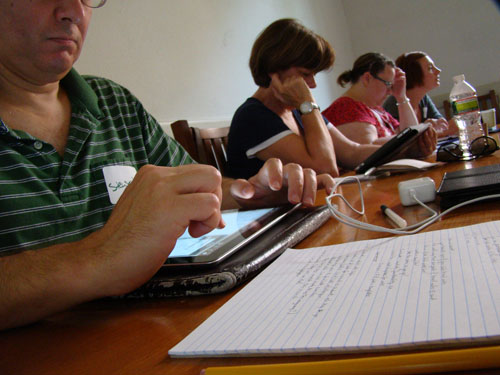
EdTechTeacher accueillera les premiers iPads nationales en sommet sur l'éducation, réunissant éducateurs, chercheurs, directeurs de technologie, Haut, les chefs d'établissement et les partenaires de l'industrie pour identifier les meilleures pratiques pour l'intégration des iPads dans l'éducation. La conférence aura lieu du 6 Novembre to 8ème Le Joseph B. Martin Conference Center, Harvard Medical School à Boston.
Les écoles et les districts dans le pays continuent d'investir dans les technologies mobiles. Le Sommet iPad EdTechTeacher espère fournir aux éducateurs dans ce pays et à l'étranger avec un forum pour discuter de la façon de tirer parti de ces dispositifs afin d'inciter davantage les enseignants et les élèves en tant que créateurs de leur propre apprentissage. “Bien qu'il existe des sessions techniques,” explique l'équipe EdTechTeacher, “l'accent est mis sur la création d'une pédagogie efficace, programme d'enrichissement, et en tirant parti du dispositif afin d'aider les étudiants et les enseignants comme des innovateurs.”
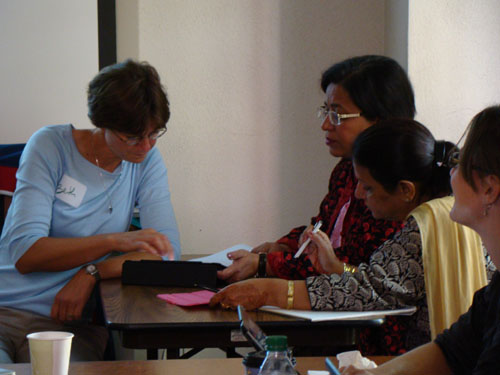
The keynote speaker at the conference is Tony Wagner, Innovation Education Fellow at the Technology & Entrepreneurship Center at Harvard. Wagner, an advocate for the need to better prepare students for 21st-century careers and citizenship, collaborated with noted filmmaker Robert Compton to create the 60 minute documentary, Le phénomène de la Finlande: Inside the World’s Most Surprising School System. Tony’s latest book, Création Innovateurs: La fabrique de jeunes qui va changer le monde (Simon & Schuster), provides a powerful rationale for developing an innovation-driven economy. He explores what parents, enseignants, and employers must do to develop the capacities of young people to become innovators. What role can the iPad play in their education? What additional professional development for teachers is needed? What examples of best technology practices can we learn from around the world? Tony agreed to discuss these subjects with me.
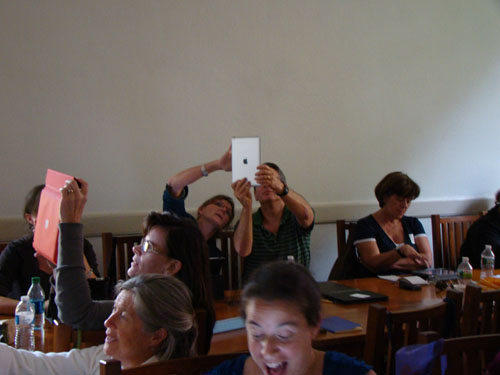
How has the iPad made learning in education more innovative, and how can educators use the iPad to achieve significant innovation in teaching and learning?
Première, the iPad has made using most computer-based learning applications far more accessible and intuitive. You no longer need to take students to a special room full of computers for that occasional experience; you don’t need to pull a laptop cart around the school. And students don’t need hours of training to learn how to use the device or its applications. Assuming a decent broadband connection, most computer related work – researching, écriture, partage – can happen at any time and for every student, with little or no advance preparation. Deuxièmement, the comparative ease of creating and distributing an iPad app, versus writing a program for a computer, has given rise to a dramatic increase in the number of education-related applications being created and disseminated. En bref, the iPad has enabled greater access for both the education consumer and the creator.
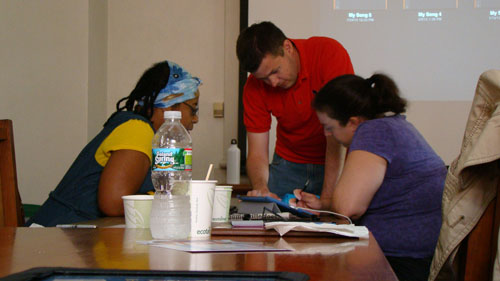
Is the missing link in education technology trained teachers?
Having teachers who are comfortable with the technology and who know how to apply it in the classroom is critical, but that problem will be mostly solved by time. As older teachers retire in growing numbers in the coming years, and many young people who are digital natives come into teaching, I think we will see a much more rapid adoption.
But the real question is: what will this technology will be used for? I toured a school district recently that had, with corporate help, put web-connected white boards and student clickers into every classroom at huge expense. Mais, in classroom after classroom, what I saw was all of this technology being used for drilling and test prep. Instead of having work sheets on their desks, students had clickers that enabled them to “vote” for the right answer on the practice test. More and better teacher preparation won’t solve this problem. We need assessments of the skills that matter most – like the online test called the College and Work Readiness Assessment, which measures problem-solving, reasoning, and writing skills – to encourage more powerful teaching and learning, both with and without the new technologies.
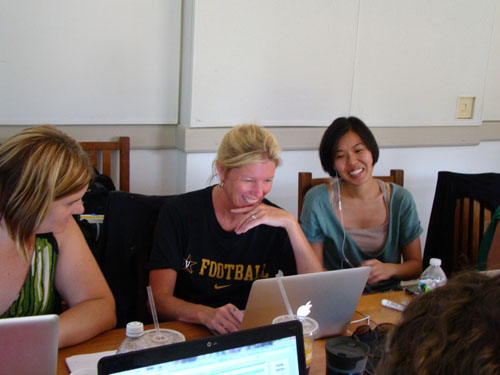
Can you share a couple of examples of good teaching/technology practice that you’ve seen in top education systems around the world, par exemple, en Finlande?
En Finlande, what I saw was much less teacher-centric uses of technologies – I don’t recall seeing a single white board, par exemple – and much more student-centric technology applications. I saw students using Moodle (the e-learning platform) to share and discuss work. In a marketing class, I saw students discussing how various social networking applications were being used to market products and services. Here in the US, I’ve seen some schools like High Tech High require all students to have digital portfolios that show evidence of progressive mastery of the skills that matter most. I’ve seen virtual dissections in biology classes that teach far more than having to actually cut up a frog. And I’m excited about new software being developed that will enable students to better understand disruptions of complex ecosystems through simulation. Enfin, the US Army has developed a wide variety of gaming applications to teach strategy.
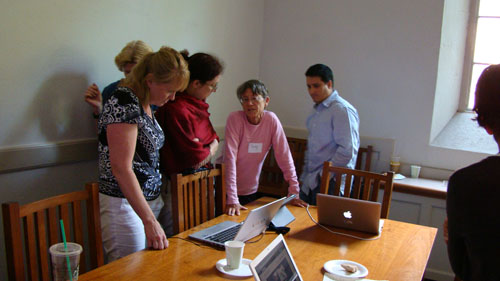
Online education continues to be an ever larger force in how students learn – how far can it go to changing education as we know it?
Knowledge is rapidly becoming a commodity and is increasingly democratized and globalized. You no longer need to be in a classroom to acquire the knowledge you want or need. But in my view, knowledge is only one of the three pillars needed for life-long learning, travail, and citizenship in the 21st century. In addition to knowledge, students also need so-called 21c skills, such as those I’ve described in L'écart global de réalisation. Enfin, students need the motivations and dispositions that will enable them to innovate – to solve problems creatively – dans tout ce qu'ils font, que je ai écrit sur le plus récemment en Création Innovateurs. They will need to learn to work in teams, understand and solve problems using multiple disciplines, persévérer, take risks, et apprendre de ses erreurs. They will need to be intrinsically motivated to acquire new knowledge and skills throughout their lives. Developing the skills, habits of mind, and dispositions of an innovator, à mon avis, requires effective coaching – ce est ce que je pense que tous les enseignants doivent se efforcer de devenir.
Pour plus d'informations: Création Innovateurs , Sommet iPad EdTechTeacher
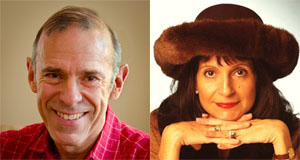
Photos gracieuseté de EdTechTeacher et Tony Wagner.
Dans La Recherche globale pour l'éducation, joindre à moi et leaders d'opinion de renommée mondiale dont Sir Michael Barber (Royaume-Uni), Dr. Michael Bloquer (États-Unis), Dr. Leon Botstein (États-Unis), Professeur Clay Christensen (États-Unis), Dr. Linda Darling-Hammond (États-Unis), Dr. Madhav Chavan (Inde), Le professeur Michael Fullan (Canada), Professeur Howard Gardner (États-Unis), Professeur Andy Hargreaves (États-Unis), Professeur Yvonne Hellman (Pays-Bas), Professeur Kristin Helstad (Norvège), Jean Hendrickson (États-Unis), Professeur Rose Hipkins (Nouvelle-Zélande), Professeur Cornelia Hoogland (Canada), Mme. Chantal Kaufmann (Belgique), Dr. Eija Kauppinen (Finlande), Le secrétaire d'Etat Tapio Kosunen (Finlande), Professor Dominique Lafontaine (Belgique), Professeur Hugh Lauder (Royaume-Uni), Professeur Ben Levin (Canada), Seigneur Ken Macdonald (Royaume-Uni), Professeur Barry McGaw (Australie), Shiv Nadar (Inde), Professeur R. Natarajan (Inde), Dr. PAK NG (Singapour), Dr. Denise Pape (États-Unis), Sridhar Rajagopalan (Inde), Dr. Diane Ravitch (États-Unis), Richard Wilson Riley (États-Unis), Sir Ken Robinson (Royaume-Uni), Professeur Pasi Sahlberg (Finlande), Andreas Schleicher (PISA, OCDE), Dr. Anthony Seldon (Royaume-Uni), Dr. David Shaffer (États-Unis), Dr. Kirsten immersive, (Norvège), Chancelier Stephen Spahn (États-Unis), Yves Thézé (Lycee Francais U.S.), Professeur Charles Ungerleider (Canada), Professeur Tony Wagner (États-Unis), Sir David Watson (Royaume-Uni), Professeur Dylan Wiliam (Royaume-Uni), Dr. Mark Wormald (Royaume-Uni), Professeur Theo Wubbels (Pays-Bas), Professeur Michael Young (Royaume-Uni), et le professeur Zhang Minxuan (Chine) alors qu'ils explorent les grandes questions d'éducation de l'image que toutes les nations doivent faire face aujourd'hui. La recherche globale pour l'éducation communautaire page
C. M. Rubin est l'auteur de deux séries en ligne largement lecture pour lequel elle a reçu une 2011 Upton Sinclair prix, “La recherche globale pour l'éducation” et “Comment allons-nous savoir?” Elle est également l'auteur de trois livres à succès, Y compris The Real Alice au pays des merveilles.


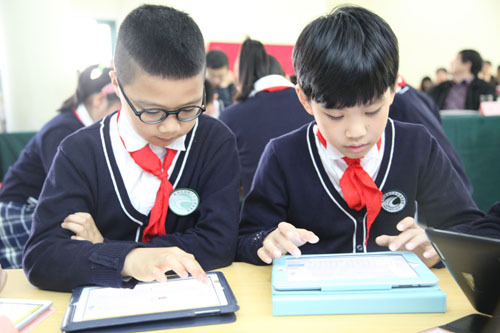
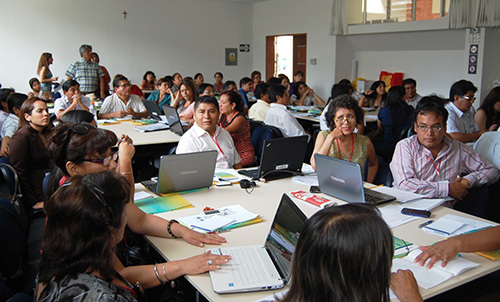

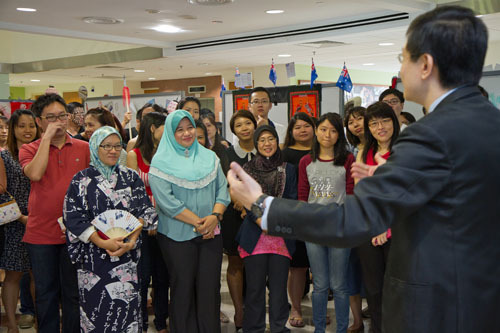
Commentaires récents